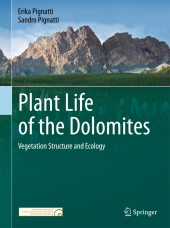 Neuerscheinungen 2013Stand: 2020-01-07 |
Schnellsuche
ISBN/Stichwort/Autor
|
Herderstraße 10
10625 Berlin
Tel.: 030 315 714 16
Fax 030 315 714 14
info@buchspektrum.de |

Philip Isenberg, Erika Pignatti, Sandro Pignatti
(Beteiligte)
Plant Life of the Dolomites
Vegetation Structure and Ecology
Übersetzung: Isenberg, Philip
2014. 2013. xxxvii, 771 S. 487 SW-Abb., 16 Farbabb., 100 Tabellen, 50 Farbtabellen. 260 mm
Verlag/Jahr: SPRINGER, BERLIN 2013
ISBN: 3-642-31042-7 (3642310427)
Neue ISBN: 978-3-642-31042-3 (9783642310423)
Preis und Lieferzeit: Bitte klicken
The first publication to include a condensed, yet complete treatment of anaphora and modality, this volume´s integrated theory combines classical formal semantics and modern dynamic semantics without altering the fundamental linguistic paradigm.
The landscape and vegetation of the Dolomites have characteristics that are very particular. Some 2300 species live here, about a fifth of the flora in Europe as a whole. This book depicts what the plant cover of the Dolomites is composed of, how it was formed, and what future evolution may bring. The data presented is based on the authors´ combined botanical research, which consists of thousands of surveys throughout the entire region of the Dolomites.
To explain the vegetation, 106 plant communities are described in detailed datasheets. Biological, geological, climatic and physical-chemical parameters are given for each plant community, including a description of the habitat, the indicator species, the floristic composition, distribution, conservation, and alteration risks, as well as a distribution map and a photo of the association. The associations are grouped into habitats, such as the human habitat, natural forests and meadows on the valley floor, the coniferous forest belt, screes, alpine vegetation on granite, porphyry, and volcanic rock, as well as on dolomite and limestones. In closing, the authors make a case for using the scientific information provided in the book for the conservation of the Dolomites, the heritage of all humanity.
Additional in-depth analysis will be presented in the supplementary volumes "Plant Life of the Dolomites: Vegetation Tables" and "Plant Life of the Dolomites: Atlas of Flora."
The Human Habitat.- Natural Forests and Meadows on the Valley Floor and in the Montane Habitat.- The Subalpine Habitat: The Coniferous Forest Belt.- Alpine Vegetation on Granite, Porphyry, and Volcanic Rock.- The Ascent toward the Cliffs: The Screes.- Alpine Vegetation on Dolomite and Limestones.- Synthesis, Data Interpretation and Statistical Calculations.- Conclusions.- Appendix: The Plant Associations of the Dolomites in the Traditional Phytosociological Classification.- Glossary.
Erika Pignatti´s main research interest is phytosociology. Among her various publications are those on the vegetation of the Austrian Alpines and the Mediterranean type vegetation in Australia and Chile. Sandro Pignatti is the author of the famous Flora d´Italia, a botany standard work. The data presented in "Plant life of the Dolomites" is based on the authors´ combined botanical research, which consists of thousands of surveys throughout the entire region of the Dolomites.


